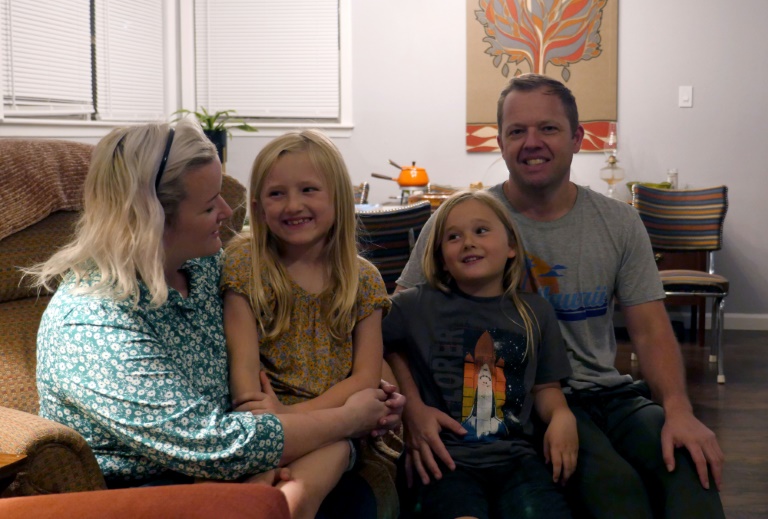Saturday 12 March 2022 -

The Bryant family, Rebekah, Sunny, Bodhi and Chet -- Sunny, 8, may take hormonal treatment when she reaches adolescence, her parents say
AFP | Francois PICARD
HOUSTON - Standing in front of a half-American, half-rainbow flag outside her home, Rebekah Bryant is outraged by a Texas order that considers medical hormonal treatments for transgender minors to be a crime.
Her transgender 8-year-old, named Sunny, might take hormonal treatment when she reaches adolescence, Bryant says, to prevent her body from going through male puberty.
"They want to take away her future rights to any kind of medical care," said the 38-year-old mother, watching over her kids as they gathered eggs from their chicken coop.
In February, Texas Governor Greg Abbott, a Republican, directed his Department of Family and Protective Services (DFPS) to "conduct a prompt and thorough investigation" into instances of minors receiving "so-called 'sex change' procedures."
He added that if any doctors, nurses and teachers failed to report cases of these "abusive procedures," they could face criminal liability.
The threat did not go unnoticed.
Last week, the largest pediatric hospital in the country, the Houston-based Texas Children's Hospital, announced it had "paused hormone-related prescription therapies" to protect its "healthcare professionals and impacted families from potential criminal legal ramifications."
The DFPS has already launched investigations into parents of transgender children, although a Texas judge on Friday issued a temporary injunction blocking Abbott's order.
Multiple local prosecutors have also said they will not file charges under the governor's order, which they argue is illegal.
President Joe Biden has come out against Abbott's stance, saying that the Texas government's "discriminatory actions put children's lives at risk."
"Children, their parents, and their doctors should have the freedom to make the medical decisions that are best for each young person -- without politicians getting in the way," said the president.
'More time' to decide
Dozens of bills have already been debated in the Texas legislature that would define "gender-affirming" treatments as child abuse, or block doctors' ability to prescribe such procedures.
Fed up, the Bryant family decided a year ago to publicize their anger, and travelled to the Texas Capitol in Austin to plead with lawmakers to stop.

Sunny Bryant poses in her bedroom in her Houston, Texas
AFP | Francois PICARD
They have since spoken out at length to advocate against Republican attempts to restrict transgender treatments.
An official legal opinion published last month by Texas Attorney General Ken Paxton claimed that "there is insufficient medical evidence available to demonstrate that discontinuing the medication resumes a normal puberty process."
In his view, that can cause "mental or emotional injury to a child" and therefore constitute child abuse.
The puberty blockers treatment that the legislators oppose is not prescribed by doctors until adolescence.
Sunny, who turns nine in April, "doesn't need any medical intervention at the moment," her mother said. "All she needs is acceptance."
Bryant is worried that if Sunny has to go through male puberty, and still decides to transition, the process would become much more complicated.
"Those changes, the forehead, the Adam's apple, the facial hair... She can't reverse that without dangerous, expensive surgeries," she said, adding that "puberty blockers give a child a lot more time (to decide)."
'Proud to be trans'
Coming from a conservative South Carolina background, Bryant's husband, Chet, has also reluctantly embraced his family's new-found celebrity.
"I definitely don't love it, for sure," he said.
"Why am I telling you about whether or not my child wears a dress or wears pants? Like, who cares?" he said in a mild but determined tone, sitting in his living room.
"That matters because of politics."

Sunny Bryant (L) plays with brother, Bodhi, in the backyard
AFP | Francois PICARD
His wife agrees: "Our Republican folks know that they can rile up their base, they can get them to the polls," if they make voters think that "they're saving these poor children."
Republicans might think that transgender issues can be a successful "wedge piece" to keep their party in power, Bryant says, "but Texas is turning slowly."
Democrat Sylvia Garcia, one of Houston's representatives to Congress, told AFP she thinks the Texas governor and attorney general made their announcements purely for political gain.
"The opinion was issued... two weeks before the primary," she noted. "The Attorney General is in a highly contested race."
"He's now in a runoff, he did not win. So I suspect he'll probably try to do even more damage and continue this rhetoric, continue this hateful campaign," she said.
The Texas governor and attorney general's offices did not respond to interview requests by AFP.
Bryant says that their family has only received support in their personal and professional interactions.
Sunny sits happily on her bed, her long hair touching her shoulders.
"I don't really feel scared the way people look at me," she said.
"I feel good and proud to be trans."
Garcia, who supports Sunny's stance, said that "if she is doing this and being such a strong voice for children all over the state and the nation, imagine what she's going to be able to do when she reaches her full potential."
"I hope that Abbott and Paxton are ready for that," she added.
Source
AFP
Judge temporarily blocks Texas investigations into families of transgender children
By Eleanor Klibanoff, The Texas Tribune
March 11 (UPI) -- State District Judge Amy Clark Meachum ruled Friday that the Texas Department of Family and Protective Services cannot continue to investigate parents who provide gender-affirming care to their transgender children for child abuse.
The statewide injunction will remain in effect until the case is heard in July.
Meachum said there is a "substantial likelihood that" lawyers for the American Civil Liberties Union and Lambda Legal will prevail in getting Gov. Greg Abbott's directive for such investigations permanently overturned, calling his actions "beyond the scope of his duty and unconstitutional."
This ruling came after a day of arguments about the directive, which the governor issued last month.
A DFPS supervisor who was called to testify at the Friday court hearing said that the child abuse investigations into families of transgender children are being held to a different standard than other cases.
Investigators can't discuss cases with colleagues via text or email, and they are required to investigate the cases, even if there's no evidence of abuse, said Randa Mulanax, an investigative supervisor with DFPS.
Mulanax has decided to resign as a result of this directive after six years with the agency.
RELATED Utah Gov. Spencer Cox to veto last-minute bill banning transgender school athletes
"I've always felt that, at the end of the day, the department had children's best interest at heart," she said. "I no longer feel that way."
Abbott's move to have families of transgender children investigated for abuse -- made one week before the state's March 1 primary election -- followed a non-binding legal opinion from Attorney General Ken Paxton.
The ACLU and Lambda Legal filed a lawsuit against the state on behalf of the parents of a transgender child who were investigated by child welfare workers after the mother, a state employee, asked questions about the new directive.
RELATED As Texas targets transgender kids, their families scramble to find lawyers
Meachum granted a temporary restraining order last week, which halted that particular case, but there are currently nine families under investigation for providing gender-affirming care, according to DFPS.
Lawyers for the ACLU and Lambda argued in court Friday that Meachum should grant a statewide injunction on all of these investigations until the legitimacy of this directive can be argued in trial.
"The defendant's directives and actions are traumatizing," said ACLU of Texas attorney Brian Klosterboer. He added that the actions are "killing the ability of transgender youth to continue to get necessary care, and forcing physicians and mandatory reporters ... to decide between civil and criminal penalties ... and doing what's right for the health of their patients."
A lawyer for the state argued that simply opening a child abuse investigation into a family is not necessarily evidence of harm to that family, and that it would be overreach for "the judicial branch to infringe on the executive branch's ability to perform such a critical task as ensuring the welfare of the state's children."
Mulanax said employees have been told not to communicate with colleagues about these cases via email or text message, which she described as unusual and "unethical."
She said investigators have been told they cannot mark these cases as "priority none," a designation staff members use when they believe a report does not merit investigation, and must alert department leadership and the general counsel when they're working on one of these cases.
A lawyer for the state asked Mulanax if any transgender children had been removed from their homes or been taken off of medication prescribed by a doctor. Mulanax said the cases had not been resolved and to her knowledge, no one had been removed or taken off of medication.
A psychologist who treats children with gender dysphoria testified to the court about the "outright panic" that her patients and health care providers have been feeling since this directive went into effect.
Megan Mooney is a plaintiff in the lawsuit. She testified about the conflict this directive has created for herself and other professionals whom the state considers mandatory reporters of child abuse.
A requirement to report her clients for receiving "medically necessary and professionally upheld standards of care" would be devastating to her clients and her business, Mooney said.
She said she doesn't believe she is in violation of any laws, since Paxton's opinion was nonbinding, but the governor's directive has sowed confusion and anxiety, as well as created an ethical conflict.
Assistant Attorney General Courtney Corbello asked whether Mooney's personal ethical disagreement with a policy means that she doesn't have to follow it.
"My ethical code from the American Psychological Association suggests that when our ethics and our laws are in conflict, we take every effort to remedy that," Mooney said. "That is in part why I am here today."
Corbello walked Mooney through the World Professional Association for Transgender Health standards for providing care for minors with gender dysphoria - assessing the child, providing family counseling and psychotherapy to children, treating any co-existing mental health concerns and providing fully reversible physical interventions, among other steps.
Mooney agreed with these steps, though she said sometimes they happen simultaneously.
Disclosure: The ACLU of Texas has been a financial supporter of The Texas Tribune, a non-profit, non-partisan news organization that is funded in part by donations from members, foundations and corporate sponsors. Financial supporters play no role in the Tribune's journalism. Find a complete list of them here.
This article originally appeared in The Texas Tribune. Read the original here.
By Eleanor Klibanoff, The Texas Tribune
March 11 (UPI) -- State District Judge Amy Clark Meachum ruled Friday that the Texas Department of Family and Protective Services cannot continue to investigate parents who provide gender-affirming care to their transgender children for child abuse.
The statewide injunction will remain in effect until the case is heard in July.
Meachum said there is a "substantial likelihood that" lawyers for the American Civil Liberties Union and Lambda Legal will prevail in getting Gov. Greg Abbott's directive for such investigations permanently overturned, calling his actions "beyond the scope of his duty and unconstitutional."
This ruling came after a day of arguments about the directive, which the governor issued last month.
A DFPS supervisor who was called to testify at the Friday court hearing said that the child abuse investigations into families of transgender children are being held to a different standard than other cases.
Investigators can't discuss cases with colleagues via text or email, and they are required to investigate the cases, even if there's no evidence of abuse, said Randa Mulanax, an investigative supervisor with DFPS.
Mulanax has decided to resign as a result of this directive after six years with the agency.
RELATED Utah Gov. Spencer Cox to veto last-minute bill banning transgender school athletes
"I've always felt that, at the end of the day, the department had children's best interest at heart," she said. "I no longer feel that way."
Abbott's move to have families of transgender children investigated for abuse -- made one week before the state's March 1 primary election -- followed a non-binding legal opinion from Attorney General Ken Paxton.
The ACLU and Lambda Legal filed a lawsuit against the state on behalf of the parents of a transgender child who were investigated by child welfare workers after the mother, a state employee, asked questions about the new directive.
RELATED As Texas targets transgender kids, their families scramble to find lawyers
Meachum granted a temporary restraining order last week, which halted that particular case, but there are currently nine families under investigation for providing gender-affirming care, according to DFPS.
Lawyers for the ACLU and Lambda argued in court Friday that Meachum should grant a statewide injunction on all of these investigations until the legitimacy of this directive can be argued in trial.
"The defendant's directives and actions are traumatizing," said ACLU of Texas attorney Brian Klosterboer. He added that the actions are "killing the ability of transgender youth to continue to get necessary care, and forcing physicians and mandatory reporters ... to decide between civil and criminal penalties ... and doing what's right for the health of their patients."
A lawyer for the state argued that simply opening a child abuse investigation into a family is not necessarily evidence of harm to that family, and that it would be overreach for "the judicial branch to infringe on the executive branch's ability to perform such a critical task as ensuring the welfare of the state's children."
Mulanax said employees have been told not to communicate with colleagues about these cases via email or text message, which she described as unusual and "unethical."
She said investigators have been told they cannot mark these cases as "priority none," a designation staff members use when they believe a report does not merit investigation, and must alert department leadership and the general counsel when they're working on one of these cases.
A lawyer for the state asked Mulanax if any transgender children had been removed from their homes or been taken off of medication prescribed by a doctor. Mulanax said the cases had not been resolved and to her knowledge, no one had been removed or taken off of medication.
A psychologist who treats children with gender dysphoria testified to the court about the "outright panic" that her patients and health care providers have been feeling since this directive went into effect.
Megan Mooney is a plaintiff in the lawsuit. She testified about the conflict this directive has created for herself and other professionals whom the state considers mandatory reporters of child abuse.
A requirement to report her clients for receiving "medically necessary and professionally upheld standards of care" would be devastating to her clients and her business, Mooney said.
She said she doesn't believe she is in violation of any laws, since Paxton's opinion was nonbinding, but the governor's directive has sowed confusion and anxiety, as well as created an ethical conflict.
Assistant Attorney General Courtney Corbello asked whether Mooney's personal ethical disagreement with a policy means that she doesn't have to follow it.
"My ethical code from the American Psychological Association suggests that when our ethics and our laws are in conflict, we take every effort to remedy that," Mooney said. "That is in part why I am here today."
Corbello walked Mooney through the World Professional Association for Transgender Health standards for providing care for minors with gender dysphoria - assessing the child, providing family counseling and psychotherapy to children, treating any co-existing mental health concerns and providing fully reversible physical interventions, among other steps.
Mooney agreed with these steps, though she said sometimes they happen simultaneously.
Disclosure: The ACLU of Texas has been a financial supporter of The Texas Tribune, a non-profit, non-partisan news organization that is funded in part by donations from members, foundations and corporate sponsors. Financial supporters play no role in the Tribune's journalism. Find a complete list of them here.
This article originally appeared in The Texas Tribune. Read the original here.
No comments:
Post a Comment